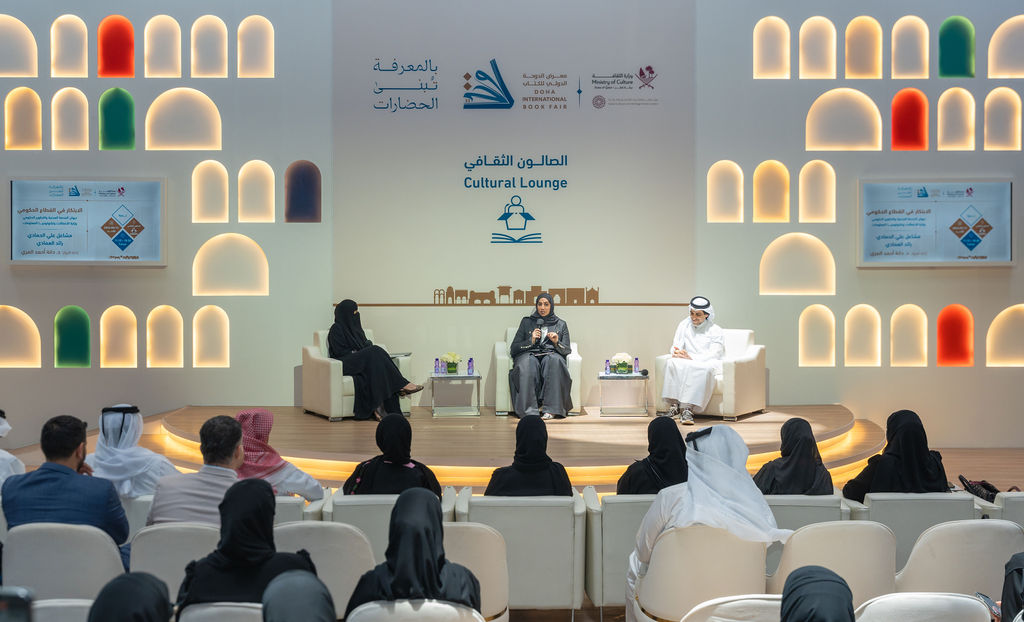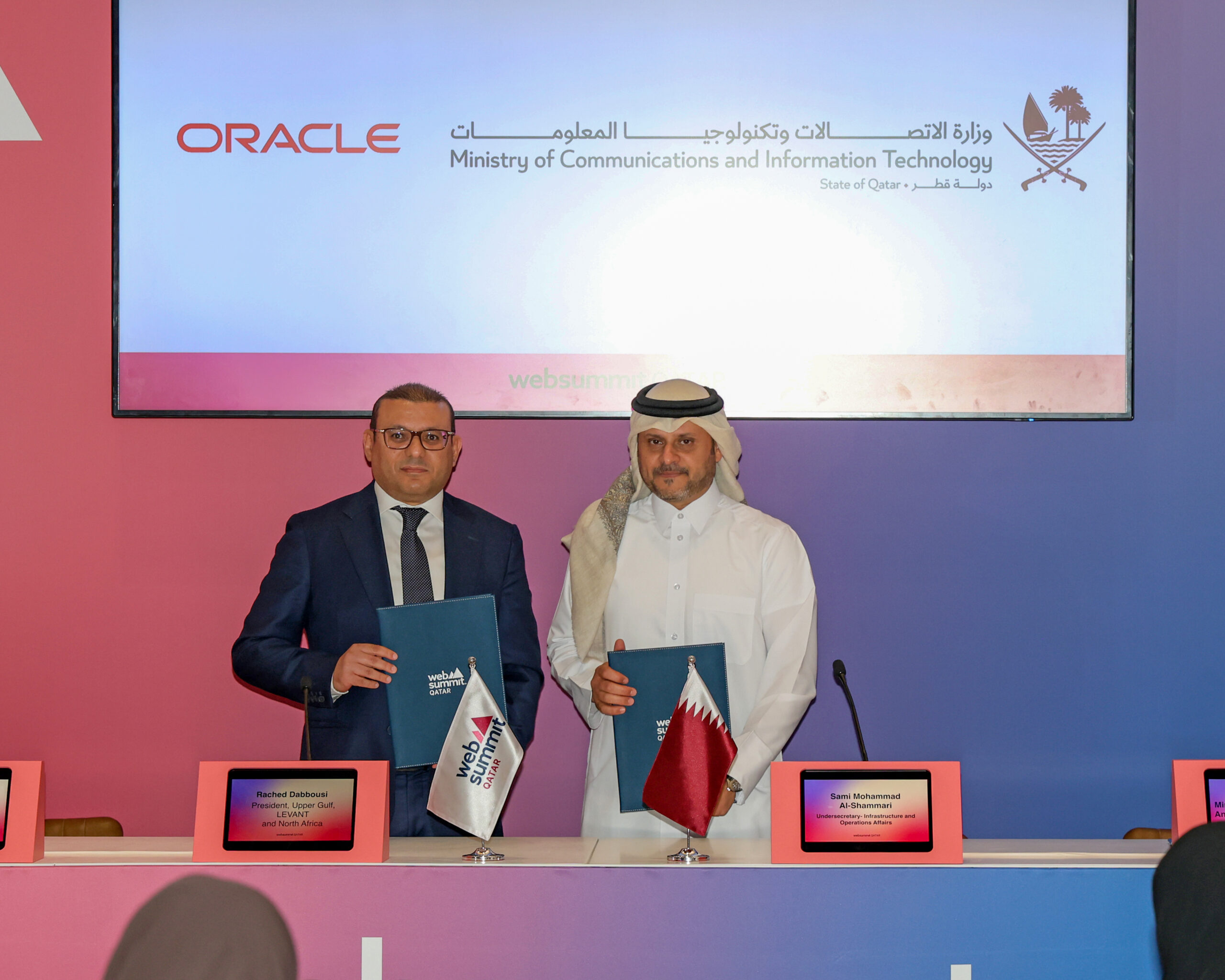- English

MCIT participates in “Innovation in the Government Sector” symposium at Doha International Book Fair
Mrs. Mashael Al Hammadi, Assistant Undersecretary for Digital Government Affairs at the Ministry of Communications and Information Technology, participated in a seminar organized by the Civil Service and Government Development Bureau under the title “Innovation in the Government Sector” within the activities of the Doha International Book Fair in its 33rd session held at the Doha Exhibition and Convention Center.
During the symposium, Ms Al Hammadi engaged in discussion with Mr. Raed Ibrahim Al Emadi, Director of Government Development Affairs at The Civil Service and Government Development Bureau, on the importance of innovation in developing government services and improving performance efficiency in various sectors. The discussion included the role of the Ministry of Communications and Information Technology in enhancing the government innovation system, and the importance of adopting artificial intelligence and ensuring its integration in the government sectors and institutions.
Mrs. Al Hammadi highlighted the multifaceted work of MCIT in supporting the government innovation system. This includes spearheading projects and initiatives that leverage modern technologies and innovative digital strategies, fostering a dynamic digital economic environment that encourages entrepreneurship and digital talent development. including:
• The Digital Agenda 2030 is an important step that reflects the comprehensive digital transformation within the country. The digital agenda offers tremendous opportunities for growth and development in various fields, creating a more efficient, effective, and interconnected future. It also works with an ambitious vision to stimulate growth paths and promote digital innovation, which is one of the six pillars of the Digital Agenda 2030.
• Utilizing Artificial Intelligence: Through the Artificial Intelligence Committee tasked with developing mechanisms to monitor and implement Qatar’s Artificial Intelligence strategy and supervising state-launched programs and initiatives related to Artificial Intelligence. Additionally, MCIT aims to support programs and initiatives that employ Artificial Intelligence technologies, such as collaboration between the Ministry and major companies, which allows government agencies to use artificial intelligence to innovate and develop qualitative applications.
• Digital Factory: This is a developmental project aimed at interactively relaunching government services for citizens and residents, enabling the development of services to meet the evolving needs of the digital community. Al Hammadi highlighted that this initiative aims to enhance interactive government services focusing on the user by providing technological solutions that align with the needs of the modern digital society, thus contributing to improving the quality of life for residents in Qatar.
Mrs. Al Hammadi emphasized MCIT’s commitment to supporting innovation and digital transformation in the government sector. This aims to improve the quality of services provided to citizens and residents and enhance the competitive efficiency of the Qatari economy.
Mr. Raed Ibrahim Al Emadi, Executive Director of Government Development Affairs at The Civil Service and Government Development Bureau, spoke about the role of the Civil Service and Government Development Bureau in promoting innovation in the government sector in accordance with the Third National Development Strategy. He pointed out that the Innovation and Acceleration Lab was established to coordinate the formation of a national agenda directing various government entities towards incorporating innovation into their strategic plans, in addition to empowering them by providing knowledge and essential tools to enhance innovative awareness that advances the strategic goals of the state. Alongside the goal of acceleration by pushing the government sector forward towards innovative projects to expedite progress towards achieving national objectives.
Al Emadi, further explained that the Civil Service and Government Development Bureau collaborates and coordinates with other relevant entities to achieve the goals of the Innovation and Acceleration Lab.
Al Emadi also addressed the role of the digital transformation process and the use of artificial intelligence mechanisms in enhancing organizational performance and government services. He noted that digital transformation is essential for accelerating improvement in performance and government services, and that the use of artificial intelligence stimulates greater innovation because it brings speed, transparency, and the ability to read and process large amounts of data. Through this, we can increase productivity in standard and repetitive tasks, thus unleashing human potential to a greater extent. He clarified that the Innovation and Acceleration Lab focuses on addressing human challenges by creating solutions deeply rooted in understanding underlying needs.
Regarding global experiments in the field of innovation application in governments, Al Emadi stated: “We truly believe in the importance of learning from the best practices and global standards in the field of innovation, and this is what guides us in the process of building and developing the innovation lab and accelerator. So, we have worked with global partners to design the lab and looked into global innovation environments.” He added: “We have identified key patterns for driving innovation in the public sectors globally, starting from research institutes to innovation labs and accelerators, and even full-fledged accelerators existing in several countries. We also studied how to implement these practices in Qatar by studying the existing environment in the country and the mechanism of cooperation with other key actors. Through learning from over 60 labs around the world, we have identified the best practices in countries’ experiments, established cooperation and partnership foundations between various government entities, and adopted an acceleration approach to enhance long-term innovation initiatives”.
Al Emadi emphasized the role of leaders in government entities in encouraging and supporting a culture of innovation within their institutions, stating that enhancing an innovative culture is a fundamental element in achieving the objectives of the Third National Development Strategy.
During the seminar, Al Emadi also discussed the Qatar Government Excellence Award, which was launched with the aim of enhancing the level of government performance quality and improving the experience of service recipients according to the best pioneering practices in quality management and governmental excellence, aligning with Qatar’s National Vision 2030 and the Third National Development Strategy.




